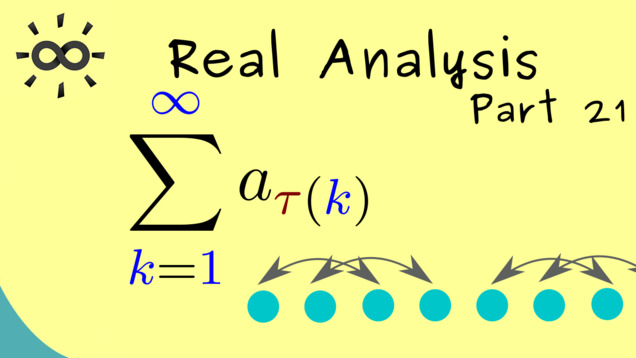
-
Title: Reordering for Series
-
Series: Real Analysis
-
Chapter: Infinite Series
-
YouTube-Title: Real Analysis 21 | Reordering for Series
-
Bright video: https://youtu.be/GADre0hHc4c
-
Dark video: https://youtu.be/M3NFkozMOqo
-
Ad-free video: Watch Vimeo video
-
Quiz: Test your knowledge
-
Dark-PDF: Download PDF version of the dark video
-
Print-PDF: Download printable PDF version
-
Exercise Download PDF sheets
-
Thumbnail (bright): Download PNG
-
Thumbnail (dark): Download PNG
-
Subtitle on GitHub: ra21_sub_eng.srt missing
-
Timestamps
00:00 Intro
00:17 Meaning of reordering of series
01:13 Example: Reordering can change the value
02:32 2nd Example with a convergent series
04:58 Definition Reordering
06:10 Theorem for abs. convergent series
06:39 Proof of the Theorem
12:22 Credits
-
Subtitle in English (n/a)
-
Quiz Content
Q1: Is the series $\displaystyle \sum_{k = 1}^\infty (-1)^{k+1} \frac{1}{k}$ absolutely convergent?
A1: Yes, it is.
A2: No, it isn’t.
Q2: When do we call a series $\displaystyle \sum_{k = 1}^\infty a_{\tau(k)}$ a reordering of the series $\displaystyle \sum_{k = 1}^\infty a_k$?
A1: It’s called a reordering if $\tau : \mathbb{N} \rightarrow \mathbb{N}$ is map.
A2: It’s called a reordering if $\tau :\mathbb{N} \rightarrow \mathbb{N}$ is a injective map.
A3: It’s called a reordering if $\tau :\mathbb{N} \rightarrow \mathbb{N}$ is a surjective map.
A4: It’s called a reordering if $\tau :\mathbb{N} \rightarrow \mathbb{N}$ is a bijective map.
A5: It’s called a reordering if $\tau :\mathbb{N} \rightarrow \mathbb{N}$ is a bijective map with $\tau(1) = 1$.
Q3: Can one change the value of a convergent series with a reordering.
A1: Yes, that is always possible.
A2: No, this is never possible.
A3: Yes, this is possible but only if the series is not absolutely convergent.
Q4: Let $q \in \mathbb{R}$ with $|q| < 1$. Can one change the limit of the series $\displaystyle \sum_{k = 0}^\infty q^k$ with a reordering?
A1: Yes, this is always possible.
A2: No, this is not possible.
A3: It possible for $q < 0$ but not for $q \geq 0$.
-
Last update: 2025-01